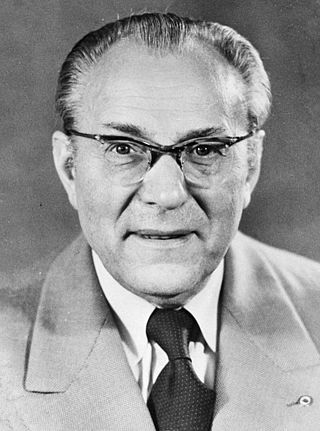
Otto Emil Franz Grotewohl was a German politician who served as the first prime minister of the German Democratic Republic from its foundation in October 1949 until his death in September 1964.
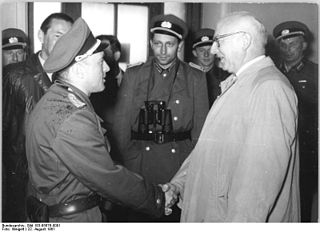
Ernst Goldenbaum was a German politician who served as the chairman of the Democratic Farmers' Party of Germany from 1948 to 1982.
The German Democratic Republic was created as a socialist republic on 7 October 1949 and began to institute a government based on the government of the Soviet Union during the Stalin era. The equivalent of the Communist Party in East Germany was the Sozialistische Einheitspartei Deutschlands,which along with other parties,was part of the National Front of Democratic Germany. It was created in 1946 through the merger of the Communist Party of Germany (KPD) and the Social Democratic Party of Germany (SPD) in the Soviet Occupation Zone of Germany. Following German reunification,the SED was renamed the Party of Democratic Socialism (PDS),which eventually merged with the West German Electoral Alternative for Labor and Social Justice to form the modern Left Party.
The Council of Ministers was the cabinet and executive branch of the German Democratic Republic from November 1950 until the country was reunified on 3 October 1990. Originally formed as a body of 18 members,by 1989 the council consisted of 44 members.

The Ulbricht Group was a group of exiled members of the Communist Party of Germany and the National Committee for a Free Germany,led by Walter Ulbricht,who flew from the Soviet Union back to Germany on April 30,1945. Composed of functionaries from the KPD and ten anti-fascist prisoners of war,their job was to seek out anti-fascist individuals and prepare the groundwork for the re-establishment of communist organizations and unions in postwar Berlin. There were two additional regional groups,the Ackermann Group in Saxony and the Sobottka Group in Mecklenburg. Many of the group's members later became high-level officials in the government of the German Democratic Republic (GDR).

The National Defense Council of the German Democratic Republic was created in 1960 as the supreme state body of the German Democratic Republic in charge of national defense matters,including mobilization planning. The NVR held the supreme command of the GDR's armed forces,and the NVR's chairman was considered the GDR's commander-in-chief.
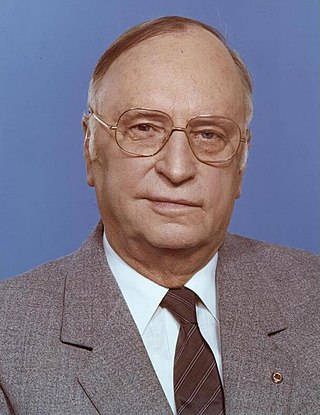
Kurt Hager was an East German statesman,a member of the Socialist Unity Party of Germany who was known as the chief ideologist of the party and decided many cultural and educational policies in the German Democratic Republic.
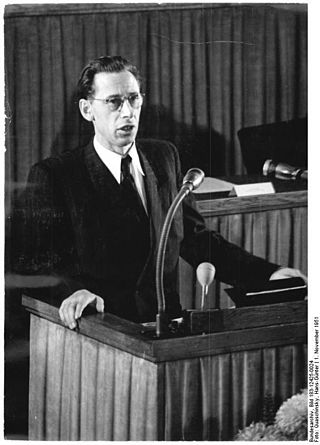
Kurt Vieweg was one of the leading agricultural politicians in the early years of the GDR. He was at various times Secretary General of the VdgB,deputy in the parliament and a member of the Central Committee of the SED.

Hans Rietz was an East German politician who became a top official in the country's Democratic Farmers' Party,which was one of five so-called bloc parties controlled by the ruling Socialist Unity Party of Germany. For many years Rietz served as a member of the National parliament ("Volkskammer") and he was also a long-standing deputy chairman of the State Council.

Paul Scholz was a German journalist and politician. He held various cabinet posts in East Germany.

Wolfgang Junker was a German construction manager and politician of the Socialist Unity Party (SED).
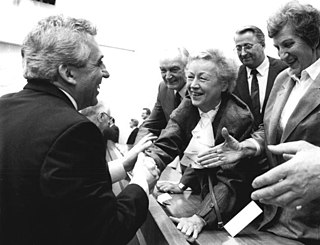
Klaus Sorgenicht was a German politician and party functionary of the Socialist Unity Party (SED).

Günter Sieber was a German politician,diplomat and party functionary of the Socialist Unity Party (SED).

Georg Ewald was a German politician and high-ranking party functionary of the Socialist Unity Party (SED).

Hans-Joachim Heusinger was a German politician and party functionary of the Liberal Democratic Party of Germany (LDPD).
Helmut Semmelmann is a former German farmer,politician and party functionary of the Socialist Unity Party (SED).

Werner Titel was a German politician and party functionary of the Democratic Farmers' Party of Germany (DBD).















